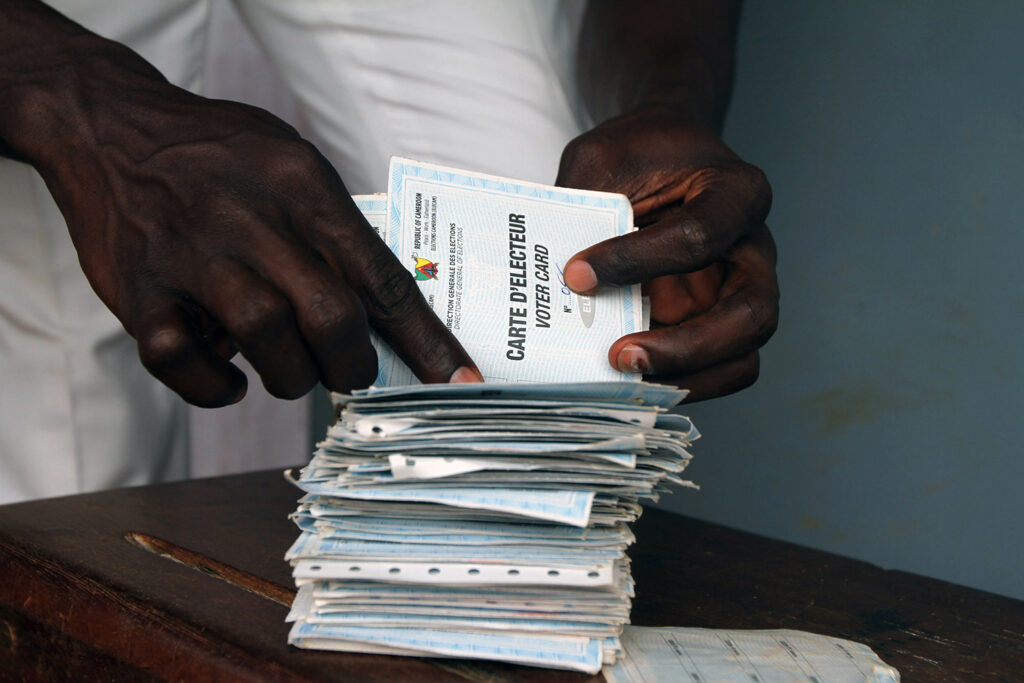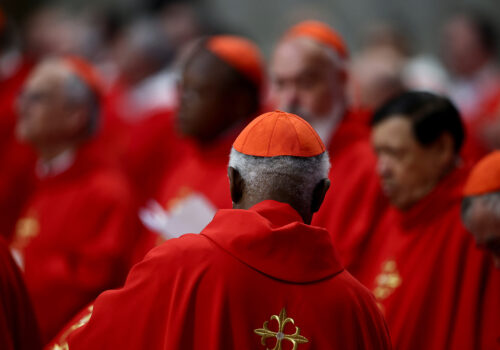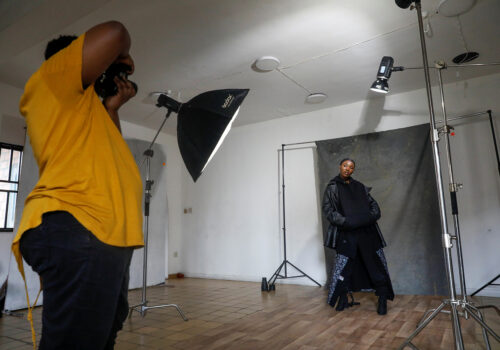Cameroon’s upcoming presidential election, slated for October 2025, is set to be a showdown of critical importance for the country. It can either break Cameroon’s pattern of disputed and unfair elections, opening the door to a democratic shift for the country, or entrench that pattern, fueling instability and leaving opportunities untapped.
Ahead of this pivotal moment, the United States can act now to support a democratic electoral process in Cameroon and help the country navigate what unfolds after the vote.
Cameroonian President Paul Biya, now ninety-two years old and having held power since 1982, is one of Africa’s longest-ruling leaders. Over the course of his decades in office, elections have been routinely marred by fraud allegations and repression. In the country’s first multiparty elections, held in 1992, Biya clung to power amid accusations of rigging, and opposition leader John Fru Ndi was placed under house arrest during ensuing protests. More recently, in the 2018 election, Biya was declared the winner and credited with 71 percent of the vote, but there were irregularities: Turnout in the conflict-torn Anglophone regions was barely 10 percent. Protests over the result led to mass arrests of opposition supporters. Despite concerns about his age and health, Biya is expected to run again, presenting himself as the guarantor of stability. However, public clamoring for change has grown loud: Catholic bishops have urged Biya to step aside, and even a pro-government newspaper opined that the long-time leader “deserves a rest” in favor of new leadership.
Biya’s ruling Cameroon People’s Democratic Movement (CPDM) and its allies are closing ranks to preserve power. Throughout 2024, several CPDM elites and patronage partners have pressed Biya to seek another term, touting his experience and warning that the country could suffer instability if he steps down. They are again mobilizing a broad coalition of smaller parties to back Biya, as in past elections. Meanwhile, intense behind-the-scenes jockeying is underway over who might succeed the aging president in a post-Biya scenario. Various power brokers have been floated as successors. Talk about one such name, Biya’s son Franck, has raised fears of an undemocratic dynastic transition. The uncertainty around succession is a significant risk factor, a ticking time bomb that could trigger factional infighting if not managed transparently.
The opposition sees 2025 as a rare chance to finally end decades of one-person rule. Over thirty opposition parties have allied to unify behind a single candidate, Maurice Kamto, aiming to overcome Cameroon’s one-round, first-past-the-post system that has historically favored the incumbent. Kamto—a former minister who insists he won the 2018 election—is campaigning on anti-corruption and reform, tapping into public yearning for change. Yet the regime has moved aggressively to undercut this challenge. Early this year, authorities banned two opposition coalitions, calling them “illegal” and “clandestine” associations, driving Kamto’s alliance underground. Legal obstacles are piling up: Election law requires a candidate’s party to hold parliamentary seats, but the Cameroon Renaissance Movement (MRC), Kamto’s party, has none after it encouraged Cameroonians to boycott a flawed 2020 legislative vote. In a brazen step, the CPDM-dominated government postponed the next legislative elections to 2026, denying the opposition any chance to gain seats before the presidential race.
Meanwhile, harassment of those who dissent continues unabated—activists and journalists are detained on spurious charges, peaceful protests are barred, and media outlets critical of the regime are silenced. These tactics cast doubt on whether the 2025 polls will be free or fair, absent significant pressure for a level playing field. Nevertheless, civil society and youth activists have been mobilizing: In 2024, they led mass voter registration drives to encourage turnout, signaling a grassroots appetite for change despite the odds.
The stakes extend beyond who wins. They encompass Cameroon’s stability, economy, and regional security. A flawed election could inflame simmering conflicts and public frustrations. The Anglophone Crisis in the country’s Northwest and Southwest regions has already killed over six thousand people and displaced nearly 700,000 internally, with around 100,000 more fleeing to Nigeria as refugees. Separatist militants reject the upcoming election and have violently enforced boycotts in those regions before, leaving a significant portion of the population disenfranchised.
Elsewhere, a contested outcome or a result marred by repression could spark unrest among a young population increasingly fed up with corruption and lack of opportunity. Ethno-regional tensions might also flare if a perceived power grab fuels resentment among communities who feel excluded. By contrast, a credible election and peaceful outcome would give the next government a mandate to address these crises, from pursuing a political solution to the Anglophone conflict to focusing the military on the Boko Haram insurgency in the Far North region. Cameroon is richly endowed with oil, timber, and fertile land, but its economic potential has been blunted by graft and mismanagement. Decades of kleptocratic governance have left over half the population impoverished. Another seven years of business-as-usual would likely deepen economic malaise and alienation, whereas a new commitment among leadership to reform could attract investment and better harness Cameroon’s resources for development.
International actors are watching closely, as Cameroon’s trajectory will impact Central African stability. France—Cameroon’s former colonial ruler—has backed Biya in the past, though French officials now avoid openly taking sides. The United States and European Union (EU) regularly urge fair elections and respect for human rights (the United States, for example, cut some military aid due to abuses in Anglophone regions). Still, their security cooperation interests temper Western leverage.
Meanwhile, other external players are exploiting the situation: Russian-linked media in Cameroon spread anti-Western narratives to bolster Biya’s regime. Regional governments, many led by entrenched leaders, generally prefer Biya to stay in power and are unlikely to press for change, prioritizing stability over democracy.
Ultimately, Cameroon’s future will be decided at home. A genuinely free and fair election would bolster Cameroon’s international standing and unlock greater foreign support, whereas a blatantly rigged vote may isolate the regime and sow internal turmoil.
Cameroon’s vote is about more than the country’s democratic future: As one analysis noted, it is part of a broader test of whether Africa’s elections will uphold democratic norms or contribute to a slide backward. Here is how the United States can help support democracy in Cameroon during this pivotal election year:
- Use diplomacy to promote a free and fair election: The United States should convince Cameroonian leaders, both publicly and privately, to uphold democratic norms in the 2025 vote. Diplomatic engagement should emphasize that opposition candidates must be allowed to compete freely, international observers should be admitted, and security forces must refrain from violence. Coordinating these messages with allies (France, the EU, and the African Union) will increase impact and help deter electoral misconduct.
- Leverage aid and security ties: Washington should tie aspects of its assistance to Cameroon’s electoral conduct and respect for human rights. The prospect of continued military aid and business engagement can be made conditional on the regime permitting a transparent election and avoiding crackdowns. Conversely, a blatantly fraudulent or violent process should prompt targeted consequences (such as visa bans or aid suspensions). By calibrating incentives and penalties, the United States can encourage accountability without undermining vital counterterrorism cooperation.
- Support election monitoring and civic engagement: To reduce the risk of fraud or unrest, the United States should back robust election-observation and civil-society initiatives. This includes supporting credible international and domestic observers and assisting local groups in voter education and parallel vote tabulation. Such efforts—coordinated with other partners—will bolster public confidence in the process, deter manipulation, and empower Cameroonians to defend their votes peacefully.
- Plan for post-election stability and reforms: The United States should prepare to help Cameroon navigate the vote’s aftermath. If the election results are disputed or violence looms, Washington (with African partners and United Nations agencies) can offer to facilitate dialogue or mediation to prevent escalation. In any outcome, the United States should encourage the winning candidate to pursue inclusive reforms—for example, an inclusive national dialogue to address the Anglophone Crisis and to introduce tangible anticorruption measures. Targeted US support (diplomatic partnership, technical aid, and peacebuilding programs) can be leveraged to help achieve these steps, reinforcing that long-term US partnership will deepen if Cameroon advances stability, inclusivity, and good governance.
Jude Mutah is a policy expert and practitioner in democracy support, peacebuilding, and governance, with over a decade of experience across Africa. He holds a Doctorate in Public Administration from the School of Public and International Affairs at the University of Baltimore.

The Africa Center works to promote dynamic geopolitical partnerships with African states and to redirect US and European policy priorities toward strengthening security and bolstering economic growth and prosperity on the continent.
Further reading
Thu, May 15, 2025
African governments should rethink their approach to combating money laundering and terrorist financing
AfricaSource By Benjamin Mossberg
African countries can bolster financial inclusion and tap economic growth opportunities—while preventing the abuse of the global financial system by nefarious actors.
Tue, May 6, 2025
The next pope may be African—or not. Either way, Africa is at the forefront of today’s Roman Catholic Church.
New Atlanticist By Alexander Tripp
An African pope is not a given in this conclave or the next, but African agency and leadership in the twenty-first-century church is.
Fri, May 2, 2025
To redefine US-Africa engagement, Washington must recognize the power of the African diaspora
AfricaSource By
Embracing the digital identity economy will allow the US to shape a mutually beneficial partnership with African countries.
Image: A man searches for his voting card at a polling unit during the presidential election in Cameroon's capital on October 9, 2011. Photo via REUTERS/Akintunde Akinleye.



